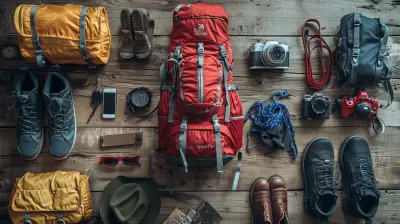Travel Cheap, But Travel Smart: Expert Advice for Budget Travelers
5 September 2025
Let’s be honest—traveling can get expensive. Between flights, accommodations, food, and sights, your wallet might feel like it's shrinking faster than your suitcase on packing day. But the truth is, you don't need a stacked bank account to explore the world. With the right strategy, a pinch of flexibility, and a dash of street smarts, you can have amazing adventures without blowing your budget.
In this guide, we’re unpacking real-deal, no-fluff advice on how to travel cheap—but smart. So if you’ve ever thought, “I can’t afford to travel,” think again. You just need the right playbook. Let’s dive in!
Why Budget Travel Isn’t About Sacrifice
First off, let’s bust a myth. Budget travel isn’t about missing out—it's about making intentional, savvy choices. You still get to soak up the culture, taste local foods, and collect jaw-dropping memories. The only difference? You're not wasting money on things that don’t actually matter.Imagine raiding a buffet—you don’t eat everything in sight. You go for your favorites. That’s what budget travel is like: focusing your energy (and cash) on what truly excites you.
1. The Golden Rule: Flexibility Is Your Secret Weapon
Want cheaper flights? Flexible with when or where you go? Then you're already ahead of the pack.Be Flexible With Dates
Flying on a Tuesday or Wednesday instead of the weekend can save you a chunk of change. Also, consider traveling during the shoulder season—just before or after peak months. You'll dodge the tourist crowds and score better deals on everything from flights to hotels.Be Open With Destinations
Always dreamed of Paris? Cool. But what if Budapest, Lisbon, or Prague offer similar charm for half the price? Use flight comparison tools like Skyscanner or Google Flights with the “Everywhere” feature and just follow the cheapest route.
2. Flights: Low Fares, High Smarts
Let’s talk airfare—a budget traveler's biggest hurdle.Use Flight Comparison Websites
Websites like Skyscanner, Momondo, and Hopper track multiple airlines and filter the best prices. Use incognito mode while searching (yes, seriously) because repeated searches can hike up prices.Book In Advance, But Not Too Early
Generally, the best time to book is 1–3 months in advance for domestic flights and around 2–6 months for international ones. Don’t fall for the myth of last-minute deals. They're rare these days.Consider Budget Airlines (But Read the Fine Print)
Budget carriers like Ryanair, Spirit, and AirAsia offer great deals—but they’re no-frills. Got carry-on luggage? That’ll cost you. Want to pick your seat? That’s extra. Read the fine print so your "cheap" flight doesn't become a pricey regret.
3. Accommodations That Won’t Break the Bank
Cushiony pillows are great—but do you really need a fancy hotel when you’re out exploring all day?Hostels Aren’t Just for Teen Backpackers
Modern hostels are often clean, stylish, and even have private rooms. Bonus: built-in community. You’ll meet fellow travelers, share tips, and maybe even split costs on tours or transport.Try Short-Term Rentals
Platforms like Airbnb or Vrbo can be cheaper than hotels—especially if you're staying longer or traveling with friends. Cooking your meals? That’s more savings!Don’t Dismiss Guesthouses or Homestays
These local stays are often cozy, authentic, and cost-effective. In places like Southeast Asia or Latin America, a night at a family-run guesthouse might cost less than your morning coffee back home.4. Eat Well and Spend Less
Let’s face it. Food is half the reason we travel. But eating out every meal? That adds up quick.Embrace Street Food
It’s delicious, cheap, and often more authentic than sit-down restaurants. Just make sure the stall is busy (a good sign of freshness) and watch how the food is prepared.Self-Cater When You Can
Grab groceries and whip up a quick pasta in your Airbnb. You don’t have to be Gordon Ramsay—just aim to eat out once or twice a day instead of three full meals.Lunch Beats Dinner
In many countries, lunch menus are more affordable. So splurge midday, and keep it light for dinner.5. Move Like a Local
Transportation can sneak up on your budget faster than a luggage fee. Here’s how to keep it in check.Walk or Rent a Bike
Best way to know a city? Walk it. Or bike it. You’ll stumble on hidden gems, save on transit, and get your steps in. Win-win-win.Use Public Transit
Trains, metros, and buses beat expensive taxis and ride-shares. Grab a city pass if you’re staying a few days—it often includes unlimited rides.Overnight Transport Saves Big
Trains or buses that run overnight not only get you to your next destination but double as a night of accommodation. Smart, right?6. Travel Insurance—Don’t Skip It!
Think of travel insurance like a seatbelt. You hope you don’t need it, but if things go south, you’ll be SO glad you have it.Look for plans that cover medical emergencies, trip cancellations, and lost luggage. Companies like SafetyWing or World Nomads cater specifically to budget and long-term travelers.
7. Activities and Sightseeing: Spend Wisely
You don’t have to see every museum or climb every tower—unless that’s your thing.Free Walking Tours Are Gold
Most major cities offer free walking tours led by locals. You tip what you can at the end. It’s a smart, budget-friendly way to get the lay of the land and pick up insider info.City Passes Can Save You Big
Some destinations offer tourist cards with free or discounted entry to major attractions, plus public transport access. If you're planning to see a lot, it's worth the upfront cost.Prioritize What Matters to YOU
Love art? Budget for museums. Foodie? Set aside cash for a cooking class or food tour. Don’t let “must-see” lists push you into spending on things you don’t actually care about.8. Make Money While You Travel
Wait—travel and earn? Yep, it’s a game-changer.Remote Work Opportunities
If your job allows for it, work remotely while exploring the world. All you need is Wi-Fi and time zone planning. Or consider freelancing in writing, design, or tutoring.Volunteer or Work Exchanges
Websites like Workaway or WWOOF match travelers with hosts who provide accommodation (and sometimes meals) in exchange for help around farms, hostels, or language practice.9. Pack Like a Pro
Overpacking is like carrying around your bad decisions on your back. Keep it light.Essentials Only
Pack clothes you can mix and match. Think layers, not bulk. A good backpack, a water bottle, and a universal adapter go a long way.Avoid Checked Bags if Possible
Especially on budget airlines, checked bags can cost almost as much as the flight itself. Learn the art of packing light—it’s liberating and budget-approved.10. Hidden Costs to Watch Out For
Even savvy travelers can get tripped up on sneaky expenses.- ATM Fees: Use cards that reimburse foreign ATM fees.
- Currency Exchange at Airports: Avoid it. Rates are typically awful.
- Roaming Charges: Use a local SIM or global data plan.
- Souvenirs: Be picky. Memories > trinkets.
Final Thoughts: Budget Travel Is a Mindset
Here's the truth: travel doesn’t have to be expensive—it has to be intentional. When you swap luxury for authenticity, you gain stories, not stuff. It’s not about being cheap, it’s about being smart. Buying value, not fluff. Investing in memories, not markups.So whatever your budget, don’t let the price tag hold you back. With a bit of planning, a splash of creativity, and a healthy sense of adventure, the world is more accessible than ever.
Now grab your passport—your next cheap (yet smart) trip is waiting.
all images in this post were generated using AI tools
Category:
Budget TravelAuthor:

Kelly Hall
Discussion
rate this article
1 comments
Talis McQuade
What a fantastic guide for budget travelers! Your tips on smart travel choices are invaluable, making adventures accessible for everyone. Can't wait to explore more of this insightful content—thank you for sharing your expertise!
September 6, 2025 at 3:43 PM

Kelly Hall
Thank you so much for your kind words! I'm glad you found the tips helpful. Happy travels!


